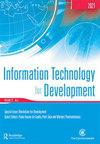A conceptual model for Indian public distribution system using consortium blockchain with on-chain and off-chain trusted data
IF 5.1
3区 管理学
Q1 DEVELOPMENT STUDIES
引用次数: 14
Abstract
ABSTRACT The public distribution system (PDS) of a country plays a vital role in eradicating hunger and ensuring food security. However, operational inefficiencies like poor beneficiary identification, non-uniform transaction records, and lack of integration among stakeholders hinder the success of such a system. This paper proposes a conceptual model to explore the possibility of using blockchain to eliminate such inefficiencies and ensure trust in the system. It first studies the existing operations of Indian PDS and identifies the transactions requiring information exchanges, storage, and verifications. Then, it proposes a blockchain based solution that leverage smart contracts and consortium-based ecosystem that can bring efficiencies in the PDS system. This paper also proposes a conceptual model for off-chain big data and enlists the possible analytics to support the decision-making of various stakeholders. Finally, it explores the suitability of implementing the proposed model as a consortium blockchain using Hyperledger Fabric and big data analytics.基于链上可信数据和链下可信数据的印度公共分配系统概念模型
摘要一个国家的公共分配系统在消除饥饿和确保粮食安全方面发挥着至关重要的作用。然而,受益人身份识别不力、交易记录不统一以及利益相关者之间缺乏整合等操作效率低下阻碍了这一系统的成功。本文提出了一个概念模型来探索使用区块链来消除这种低效率并确保对系统的信任的可能性。它首先研究了印度PDS的现有业务,并确定了需要信息交换、存储和验证的交易。然后,它提出了一个基于区块链的解决方案,利用智能合约和基于联盟的生态系统,可以提高PDS系统的效率。本文还提出了一个链下大数据的概念模型,并收集了可能的分析方法来支持各个利益相关者的决策。最后,它探讨了使用Hyperledger Fabric和大数据分析将所提出的模型作为联盟区块链实施的适用性。
本文章由计算机程序翻译,如有差异,请以英文原文为准。
求助全文
约1分钟内获得全文
求助全文
来源期刊

Information Technology for Development
Multiple-
CiteScore
11.30
自引率
16.70%
发文量
34
期刊介绍:
Information Technology for Development , with an established record for publishing quality research and influencing practice, is the first journal to have explicitly addressed global information technology issues and opportunities. It publishes social and technical research on the effects of Information Technology (IT) on economic, social and human development. The objective of the Journal is to provide a forum for policy-makers, practitioners, and academics to discuss strategies and best practices, tools and techniques for ascertaining the effects of IT infrastructures in government, civil societies and the private sector, and theories and frameworks that explain the effects of IT on development. The concept of development relates to social, economic and human outcomes from the implementation of Information and Communication Technology (ICT) tools, technologies, and infrastructures. In addition to being a valuable publication in the field of information systems, Information Technology for Development is also cited in fields such as public administration, economics, and international development and business, and has a particularly large readership in international agencies connected to the Commonwealth Secretariat, United Nations, and World Bank.
 求助内容:
求助内容: 应助结果提醒方式:
应助结果提醒方式:


